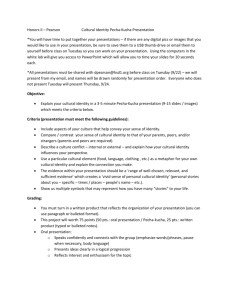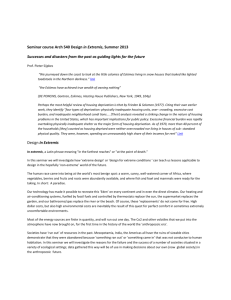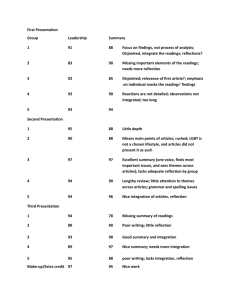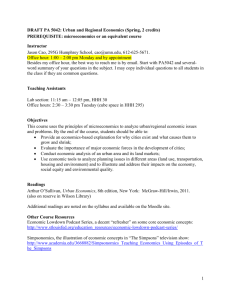Syllabus: Social Psychology: Part I
advertisement
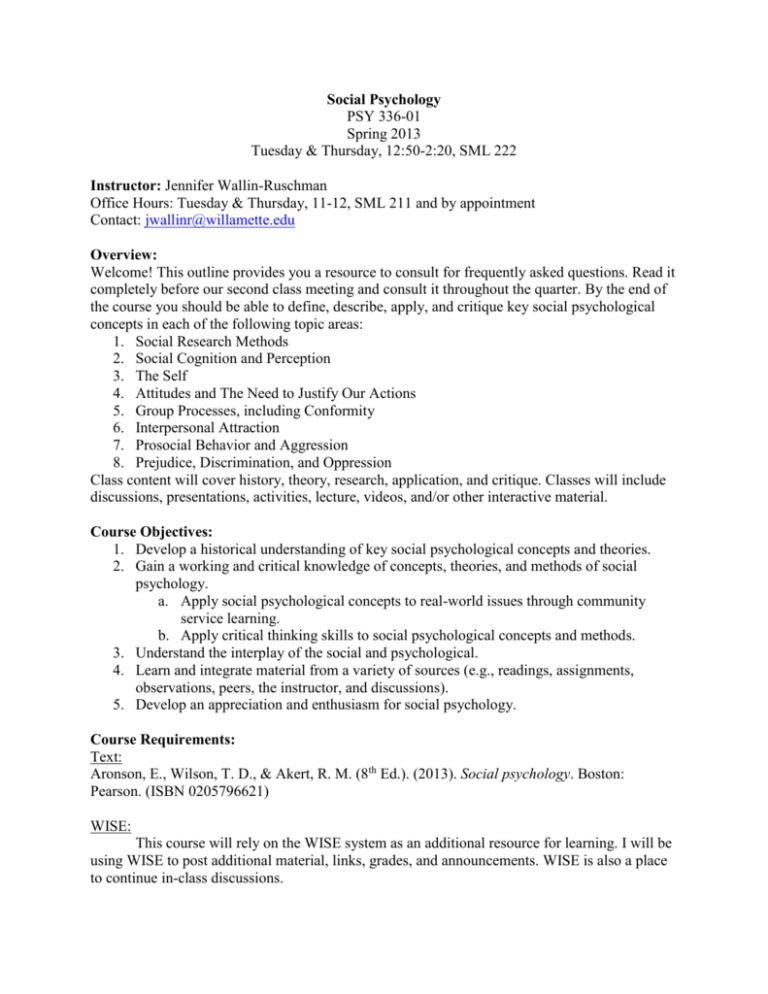
Social Psychology PSY 336-01 Spring 2013 Tuesday & Thursday, 12:50-2:20, SML 222 Instructor: Jennifer Wallin-Ruschman Office Hours: Tuesday & Thursday, 11-12, SML 211 and by appointment Contact: jwallinr@willamette.edu Overview: Welcome! This outline provides you a resource to consult for frequently asked questions. Read it completely before our second class meeting and consult it throughout the quarter. By the end of the course you should be able to define, describe, apply, and critique key social psychological concepts in each of the following topic areas: 1. Social Research Methods 2. Social Cognition and Perception 3. The Self 4. Attitudes and The Need to Justify Our Actions 5. Group Processes, including Conformity 6. Interpersonal Attraction 7. Prosocial Behavior and Aggression 8. Prejudice, Discrimination, and Oppression Class content will cover history, theory, research, application, and critique. Classes will include discussions, presentations, activities, lecture, videos, and/or other interactive material. Course Objectives: 1. Develop a historical understanding of key social psychological concepts and theories. 2. Gain a working and critical knowledge of concepts, theories, and methods of social psychology. a. Apply social psychological concepts to real-world issues through community service learning. b. Apply critical thinking skills to social psychological concepts and methods. 3. Understand the interplay of the social and psychological. 4. Learn and integrate material from a variety of sources (e.g., readings, assignments, observations, peers, the instructor, and discussions). 5. Develop an appreciation and enthusiasm for social psychology. Course Requirements: Text: Aronson, E., Wilson, T. D., & Akert, R. M. (8th Ed.). (2013). Social psychology. Boston: Pearson. (ISBN 0205796621) WISE: This course will rely on the WISE system as an additional resource for learning. I will be using WISE to post additional material, links, grades, and announcements. WISE is also a place to continue in-class discussions. Classroom norms: To have a productive learning environment, I believe it is essential to promote a respectful class climate. Some guidelines to keep in mind in accomplishing this goal are: speak from your own experience, engage thoughtfully with the content of the class, do not expect yourself or other class members to speak as a representative of a social and/or cultural group. These guidelines are just a starting point, on the first day of class we will work together to develop a set of classroom community guidelines that will be posted on WISE and referred to throughout the term. Grading Scheme: Introduction Assignment: 10 points Reading Reflections: 200 points Community Engagement: 50 points Class Part. & Attendance: 80 points Group Facilitation: 50 points Final Paper and Presentation: 100 points Closing Assignment: 10 points Total: 500 points Approximate Grading Scale: A = 463 – 500 points (93 – 100%) A- = 448 – 462 points (90 – 92%) B+ = 433 – 447 points (87 – 89%) B = 413 – 432 points (83 – 86%) B- = 398 – 412 points (80 – 82%) C+ = 383 – 397 points (77 – 79%) C CD+ D DF = = = = = = 363 – 382 points (73 – 76%) 348 – 362 points (70 – 72%) 333 – 347 points (67 – 69%) 313 – 332 points (63 – 66%) 300 – 312 points (60 – 62%) below 300 points (below 60%) Assignments: Introduction Assignment (10 points) On the first day of class you will write a statement (1-2 pages) about why you are taking this course (your objectives), what you want to learn, and some information about yourself (e.g., major, your future goals). Class Participation and Attendance (50pts + 30pts= 80 points) Attendance and participation are essential components of this class. We will strive to create a classroom atmosphere in which open dialog and communication are comfortable and encouraged. Please ask questions, offer observations, and suggest alternative perspectives during class. Occasionally there will be take home assignments to complete between classes in order to participate fully in the next class (e.g., creating and conducting your own mini-psychological study). Also, reading before class is essential to being able to participate fully in class. We will often have structured activities that depend on the day’s class readings. In addition to active participation, daily reflection cards or Exit Tickets will be collected. Each day of class you will be given an index card. The last few minutes of each class will be reserved to compose a brief reflection on the day (e.g., what did you learn, what are you still confused about, what questions do you still have, what went well/poorly in the class today, and/or how is your group working going?). Each of these ‘tickets’ is worth 1 point towards your final grade (so be sure to put your name on the index card so I can give you credit). Also, I will use your responses to address unanswered questions, areas of confusion, and to amend the course structure when appropriate. Up to 30 points will be award by accumulating exit tickets and up to 50 points will be award for class participation using the guidelines in the table below (adapted from Professor Miller). A Actively participates every week. Asks questions and brings up discussion points without having to be prompted. Questions are exceptionally thoughtful and demonstrate a thorough understanding of the readings. Completes high quality out of class activities. B Actively participates each week. Demonstrates an understanding of the readings on a weekly basis. Questions are relevant, and demonstrate an understanding of the readings. Completes the out of class activities. C Participates each week. Engages with the week’s topic and readings although some gaps in understanding may be evident. Listens but rarely comments. Only completes some of the out of class activities. D Attends class each week, but does not participate actively. Responds to direct questions but does not volunteer opinions. Comments reveal only surface level understanding of the readings/topic. Does not volunteer information and lack of preparation may be evident. Does not complete out of class activities. Reading Reflections (40 pts x 5= 200 points) The purpose of writing reflection papers is to help you think critically about assigned readings and to consider how readings relate to the lectures, other readings, current events, social problems, to your community engagement project, and your own life experiences. Each paper will use the below questions as a guide. The purpose of these reflection questions is to provide you with an opportunity to process new information obtained from the readings through the context of your lived experience. However, your answers must be grounded in the readings. Reading reflections should be three to five pages long, double-spaced, 12-point font. Papers are due at the beginning of class on the days indicated in the attached course schedule. Late papers will not be accepted. Note: There are six reflections so you get one free pass. You can either skip a reflection or drop your lowest score at the end of the term. Reading Reflection Generic Questions: A. What do you find most persuasive/inspiring/problematic/encouraging about any aspect of the readings (be specific—concept, argument, fact, theory, explanation, etc). *Do not try to cover everything in the readings* B. Regarding the above, how does it challenge or advance your and/or our thinking? C. Describe how you would use or apply this insight. D. Relate the readings to one another, to other readings in the class, and to other knowledge you have. Do they support one another? Contradict? Note: during some weeks I may ask more specific questions Groups Facilitation (50 points) On the second day of class you will break into groups of 5. You will meet in these groups throughout the term. During the first meeting you should identify a different group member to be facilitator for each of the 5 group facilitations as outlined in the class schedule. When it is your week to facilitate you are responsible for coming up with an engaging activity and discussion questions that are pertinent to the assigned chapters. Your activity and discussion should last for 30 minutes. If your facilitation does not take 30 minutes your grade will be penalized so I recommend over-preparing. The points for this assignment will be awarded on the basis of a self-assessment (10 points) and peer-assessment (40 points). The rubric for grading, which you should also use to help you prepare, will be distributed during the first week of class. The object of the group facilitation is not to cover everything in the specified chapters but to go deeply into a few topics. You may use material form one or both chapters assigned to your facilitation week. Community Engagement (10pts x 5= 50 points) This course will include an individual community service-learning component. If you are already engaging in some form of regular community service work, you may use that. If not, you should meet with someone in the Community Service Learning Department to help place you in an appropriate opportunity. You should engage in a minimum of 20 hours of community work throughout the term. I am open to a broad ranger of interpretations of what ‘counts’ as community engagement, so please talk to me if you have questions about an activity. Community engagement papers are due on the same day as the reading reflections and should be at least two pages long, double-spaced, with 12-point font. For each paper you should briefly reflect on your experiences in your community setting (e.g., What did you see? What did you think? What did you feel? What did you do?) and you should connect and/or apply approximately three concepts or theories from class to your experience. However, your first paper will look a bit different. For the first reflection you should write about your community engagement setting and population broadly (e.g., Tell me about the setting, what you do in the setting, and how you got involved) and connect this to social psychology broadly (e.g., How do you think social psychology will help you understand your experience? What about the experience of others in the setting?). Note: Like the reflections, you get one free pass, but you cannot skip the very first one. Final Paper and Presentation (50 pts + 50 pts= 100 points) For a culminating experience in the course you will more fully integrate what you learned and experienced in your community service learning to the course material and to a social problem more broadly. Although this is a culminating project, you will work toward this all semester. Toward the beginning of the semester we will divide into groups according to similarities in community service setting. For example, the class might have groups that are working on the broad topics of education, immigration, homelessness, law, and/or social movements. You will meet in these groups throughout the semester so that you have a chance to talk through, reflect, and debrief on your community engagement experience and its relation to the course. These groups will also be giving the presentations at the end of the quarter. Group presentations will be worth 50 points of your final grade. The points will come from a combination of peer evaluation (20 pts), instructor evaluation (20 pts), and self evaluation (10 pts) a rubric will be handed out early in the semester. Presentations should be 15 to 25 minutes in length, shorter presentations for smaller groups and longer presentations for larger groups. As for presentation format, feel free to use whatever format you are most comfortable with to do this project. You may use videos, PowerPoint presentations, class activities (may need more time with this option), skits, music, art, reading, and/or lecture. Presentation content will vary depending on the focus of the group members and their varying experiences. However, presentations, at minimum, should relate community service learning experiences to a broader social problem or issue and connect this to social psychological concepts and theories. You may use some of your in-class group meeting time to plan your presentation. I am happy to meet with groups that are struggling to put together a presentation. Also, you should be bringing in additional scholarly material to support your groups arguments and discussions. Remember to cite your sources using APA format. The final papers are an individual project, although they do relate to the group presentations. Papers should be three to five pages long, double-spaced with 12-point font. Final papers, like the presentation, should connect a broad social problem with your community service learning experience and concepts and theories learned in class. A particularly useful way to do this could be to talk about how you developed an understanding of the setting/ individuals in the setting (e.g., How did your understanding of the setting/people change over time? What prompted this change? What do you wish you could change about the setting?). Final papers are due on the last day of class. Like the presentation, you should be bringing in additional scholarly material to support your arguments and using APA format to cite your sources. Closing Assignment (10 points) On the final day of class you will write a short response (approximately two pages) detailing your experiences in the course. Specifically, some examples of what you took away from the course, what you would do differently if you took the course again, and what I could do differently if I taught the course again. There is no right or wrong answer, the assignment is simply intended to facilitate reflection on what you have taken away from this course and help me improve the course in the future. Extra Credit: (up to 10 pts) This term we will cover a wide range of topics, each of which people dedicate their entire lives to understand. As such, I do not know everything. If someone asks a question in class that the instructor or another classmate is unable to provide a satisfactory answer to, then you will be given an opportunity to independently research the question. Please let me know if you decide to take this opportunity and what you will be writing about. To receive any credit you must submit your findings in writing (at least 3 double spaced pages) on of before the last day of class. You should be using at least one scholarly source for your response. Students may be encouraged, but not required, to spend a few minutes presenting their results in class. There may be opportunities for this throughout the term but there is designated time during the last week of class. Grade Disputes: All grade disputes must be submitted in writing. The written grading dispute should clearly articulate your justification, or principled argument, for the grade adjustment. Additional Notes: Ethical Behavior and Plagiarism: You are expected to maintain a high standard of personal ethics. Any evidence of cheating, helping others to cheat, or plagiarism will lead to serious academic consequences, such as zero credit for associated work and potentially failing the course. To avoid plagiarism on written assignments students must use citations and references in APA format when they quote or paraphrase the work of other authors, including our text. It is your responsibility to check Willamette’s policy on academic honesty and to make sure you understand what plagiarism is: http://www.willamette.edu/cla/catalog/Sect3/aca.html Attendance Attendance is important and Exit Tickets, which you can only get if you are in class, make up a part of your final grade. As a show of respect to myself and your peers I ask that you make a sincere effort to be on time and minimize distractions once you’ve arrived. The group work in this course requires you to be present and on time. This includes not packing up your materials and leaving before the day’s material is complete. In return, I’ll do my best to respect your time by not exceeding our allotted time together. Note: When you miss a class you should utilize your peers to get notes and handouts from the class. Class Discussions Participation in class discussions is encouraged. Throughout the course, you are welcome to reflect on class material and share your thoughts. The basic ground rule for class discussion is respect. Differences of opinion are welcome, as they provoke us to re-examine our own thinking (i.e., learn!). You should always maintain respect for opinions differing from your own. Late Assignments Late assignments will be marked down one letter grade for every day they are late. All assignments are due in print at the beginning of class on the due date. Special Accommodations I will respect any accommodations authorized by the Office of Disabilities Services. Please tell me about these accommodations as soon as possible. Office Hours Office hours are for you. Come by and continue a class discussion, go over your assignments, or talk about the application of course material. If the scheduled office hours do not work with your schedule we can find an alternative time to meet. Other: If you feel there is something about you that might impact your experience in this class that I should be aware of, please let me know. If anything arises during the term, please speak to me as soon as possible. Schedule Note: This schedule is subject to change. Any and all changes will be announced in class and posted on the class WISE web site. Tuesday, 1/15: Review Syllabus and Introduction Assignment Reading: None Thursday, 1/17: Co-creating Classroom Community and Form Facilitation Groups Reading: Syllabus Tuesday, 1/22: Reading: Chapter 1- Introduction to Social Psychology Thursday, 1/24: Form Community Service Learning/Presentation Groups Reading: Chapter 2- Methodology Tuesday, 1/29: Article Discussion Reading: Online- Education, Research, and Action Thursday, 1/31: Reading: Chapter 3- Social Cognition Tuesday, 2/5: Group Facilitation 1 (chapter 3 or 4) Reading: Chapter 4 –Social Facilitation Thursday, 2/7: Reading Reflection 1 and Community Engagement Papers Due Reading: Chapter 4 –Social Facilitation Tuesday, 2/12: Community Engagement Groups Meet and Distribute Presentation Rubric Reading: Chapter 5- The Self Thursday, 2/14: Reading: Chapter 5- The Self Tuesday, 2/19: Group Facilitation 2 (chapter 5 or 6) Reading: Chapter 6- The Need to Justify Our Actions Thursday, 2/21: Reading Reflection 2 and Community Engagement Papers Due Reading: Chapter 6- The Need to Justify Our Actions Tuesday, 2/26: Community Engagement Groups Meet Reading: Chapter 7 – Attitudes and Attitude Change Thursday, 2/28: Reading: Chapter 7 – Attitudes and Attitude Change Tuesday, 3/5: Group Facilitation 3 (chapter 7 or 8) Reading: Chapter 8- Conformity Thursday, 3/7: Reading Reflection 3 and Community Engagement Papers Due Reading: Chapter 8- Conformity Tuesday, 3/12: Community Engagement Groups Meet Reading: Chapter 9- Group Processes Thursday, 3/14: Reading: Chapter 9- Group Processes Tuesday, 3/19: Group Facilitation 4 (chapter 9 or 10) Reading: Chapter 10- Interpersonal Attraction Thursday, 3/21: Reading Reflection 4 and Community Engagement Papers Due Reading: Chapter 10- Interpersonal Attraction Tuesday, 4/2: Community Engagement Groups Meet Reading: Chapter 11- Prosocial Behavior Thursday, 4/4: Reading: Chapter 11- Prosocial Behavior Tuesday, 4/9: Group Facilitation 5 (chapter 11 or 12) Reading: Chapter 12- Aggression Thursday, 4/11: Reading Reflection 5 and Community Engagement Papers Due Reading: Chapter 12- Aggression Tuesday, 4/16: Community Engagement Groups Meet Reading: Chapter 13- Prejudice Thursday, 4/18: Reading: Chapter 13- Prejudice Tuesday, 4/23: Reading: Online- Five Faces of Oppression Thursday, 4/25: Reading Reflection 6 and Community Engagement Papers Due and Group Presentations Reading: None Tuesday, 4/30: Final Papers Due, Group Presentation, and Closing Assignment Reading: None
